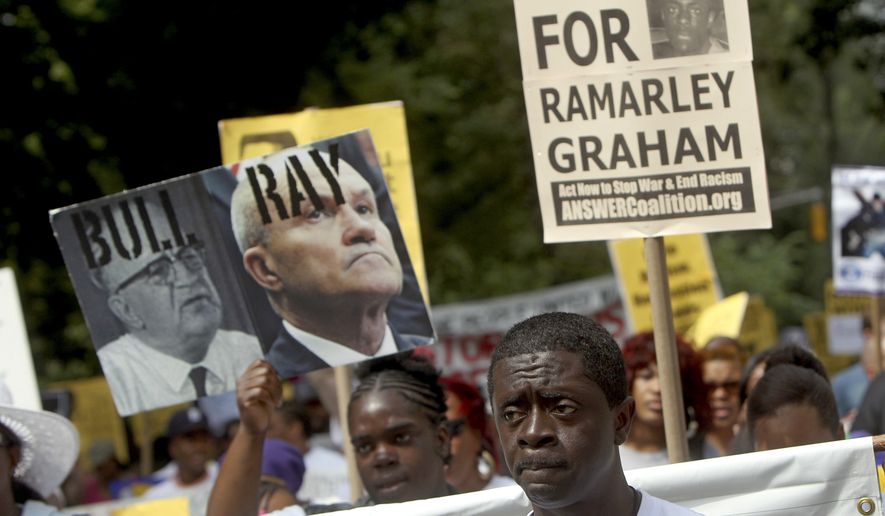The Justice Department announced Tuesday it will not bring federal charges against a New York City Police Department officer who fatally shot an unarmed black man inside his apartment in 2012.
The decision drew swift condemnation from community activists, who questioned why officers pursued Ramarley Graham, kicked down the door to his apartment, and shot him as he retreated into the bathroom after officers erroneously suspected he was carrying a firearm.
U.S. Attorney for the Southern District of New York, Preet Bharara, announced Tuesday that there was “insufficient evidence” to bring federal criminal charges against NYPD Officer Richard Haste, who fired the single shot that killed Graham.
In his announcement, Mr. Bharara noted that there was no evidence that would refute Officer Haste’s version of the sequence of events that occurred just moments before the shooting. Though Graham’s grandmother and his 6-year-old brother were in the apartment at the time of the shooting, neither saw the shooting, nor was there any video recording of the incident.
“At this critical moment in time, no other witness present in the apartment, including Mr. Graham’s grandmother, had a view of Mr. Graham,” Mr. Bharara said. “There are no witness accounts or physical evidence that materially contradict Officer Haste’s statement that Mr. Graham appeared to be pulling something from his waistband at the time of the shooting.”
Narcotics enforcement officers had begun to pursue Graham after he was seen leaving a bodega where they were conducting surveillance, according to prosecutors. An officer radioed to others that he saw a handgun tucked into the waistband of Graham’s pants. Officers followed Graham to his apartment, and forced entry to the building to follow him inside, kicking down the door of the apartment to enter.
Officer Haste, who is white, ordered Graham to show his hands, but said that Graham instead moved to an adjacent bathroom. According to the narrative provided by prosecutors, when the officer reached the bathroom, he said that Graham made a movement as if to pull something from his waistband and Officer Haste fired the fatal round.
No firearm was found at the scene. Instead, officers found a bag of marijuana in the toilet bowl next to where Graham had been standing.
Bronx Borough President Ruben Diaz Jr. called the decision not present the case to a grand jury “an outrage.”
“At a time when the issue of police-community relations has been at the forefront of American discourse — especially the treatment of minorities by those charged to protect and serve them — the U.S. Attorney’s office has failed to set an example for our nation,” Mr. Diaz said. “Given what we know about the facts of this case, how could they not have convened a grand jury? The U.S. Attorney owes our community a real explanation.”
The announcement marks an end to a controversial and drawn out case.
A Bronx grand jury initially indicted Officer Haste on a state manslaughter charge in 2012, but a judge threw out the indictment after determining that prosecutors had improperly instructed grand jurors. A second grand jury declined to indict the officer.
Graham’s family received a $3.9 million settlement from New York City. Meanwhile Officer Haste was Haste was moved to the NYPD’s fleet services division. Internal disciplinary proceedings against him have been on hold as the department awaited the outcome of the federal investigation.
Graham’s family said it was heartbreaking to learn that prosecutors would not bring federal charges.
“It’s been four years and to wait four years and get this decision, it’s like a slap in the face,” Graham’s mother Constance Malcolm, told the New York Daily News.
Patrick J. Lynch, president of the Patrolman’s Benevolent Association, offered sympathies to the family but said he was glad to hear there would be no charges filed.
“There is no winner here,” Mr. Lynch said. “The officer was working to combat the scourge of guns and drugs in the community. The good faith effort to combat those ills brought us to this tragedy.”
• Andrea Noble can be reached at anoble@washingtontimes.com.




Please read our comment policy before commenting.